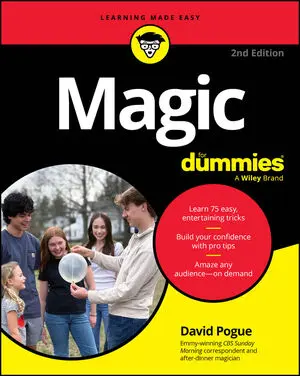The field of magic — videos, lectures, and books — is filled with jargon you should know in order to learn and practice magic tricks. Here’s a guide to some of the magic terms you’ll hear most often:
burn — To watch a trick intensely, with an unblinking stare, immobile head, and general resistance to conventional misdirection. A spectator who’s burning you clearly isn’t there to be entertained.
clean — The blissful state when a magician’s hands and props can be examined because they’re not rigged in any way. The audience can inspect the props from now until doomsday without learning how you did the trick.
confederate — A secret assistant pretending to be an audience member. The confederate may, for example, subtly feed the magician information. Confederates should be used infrequently, and rarely as the primary "spectator" in an audience-participation trick (otherwise, their assistance will be too obvious).
false shuffle — To simulate shuffling the deck without actually altering the position of certain cards. Some false shuffles are designed to keep all 52 cards in their original locations. Other false shuffles keep only some cards — such as the top or bottom one — in their original locations.
force — A standard magic procedure in which an audience member is offered what seems to be a fair and free choice (usually of cards) — but, in fact, the magician has predetermined the outcome.
French Drop — A sleight usually used to vanish a coin held at the fingertips. Magicians today rarely use the French Drop because of its unnatural appearance.
gimmick — A piece of equipment, unseen by the spectator, that helps the magician accomplish the effect. (You may also hear the adjective form, used to describe a prop that’s been specially rigged: “You probably have a gimmicked pretzel.”)
impromptu — Without advance preparation, using the materials at hand.
lap — To secretly drop something into your lap (when seated at a table) — or to retrieve an object already there. Never lap anything that has an open flame.
misdirection — Audience distraction. Misdirection is an essential magic skill — probably the most important one; by directing the audience’s attention, you create opportunities to do tricky maneuvers where the audience isn’t looking.
palm — A tricky move in which a card, coin, or other object is concealed in what’s supposed to be your empty hand — for example, by pinching it between opposite sides of your cupped hand. There are many forms of palming: finger palms, thumb palms, back palms, and so on.
patter — What a magician says while performing.
play — To work as rehearsed (and to be enthusiastically accepted by the audience). Professionals often recommend tricks or presentations by saying, “This definitely plays.”
riffle shuffle — The most common way to shuffle a deck of cards: The two halves of the deck are butted against each other, their ends interlaced by riffling, and finally mixed by pushing the two halves together.
routine — A series of tricks performed in a logical sequence.
sleight-of-hand — The secret manipulation of props (usually by the fingers) to generate a miraculous effect. When magicians speak, they drop the last two words: “He did a version of the trick involving sleights.”
stacked deck — Also known as a “set-up” or “prearranged” deck. A deck whose cards the magician has pre-arranged, unbeknownst to the audience.
stage illusion — A trick that’s big enough to be performed in a large auditorium. Examples of famous stage illusions: The Levitation; Sawing a Woman in Half; The Water Torture; Vanishing an Elephant.
sucker trick — A trick in which you let the spectators believe that they understand how a trick is done — only to have their “understanding” dashed.
vanish — (a verb, oddly enough): To make something disappear. “He vanished my wallet!”





